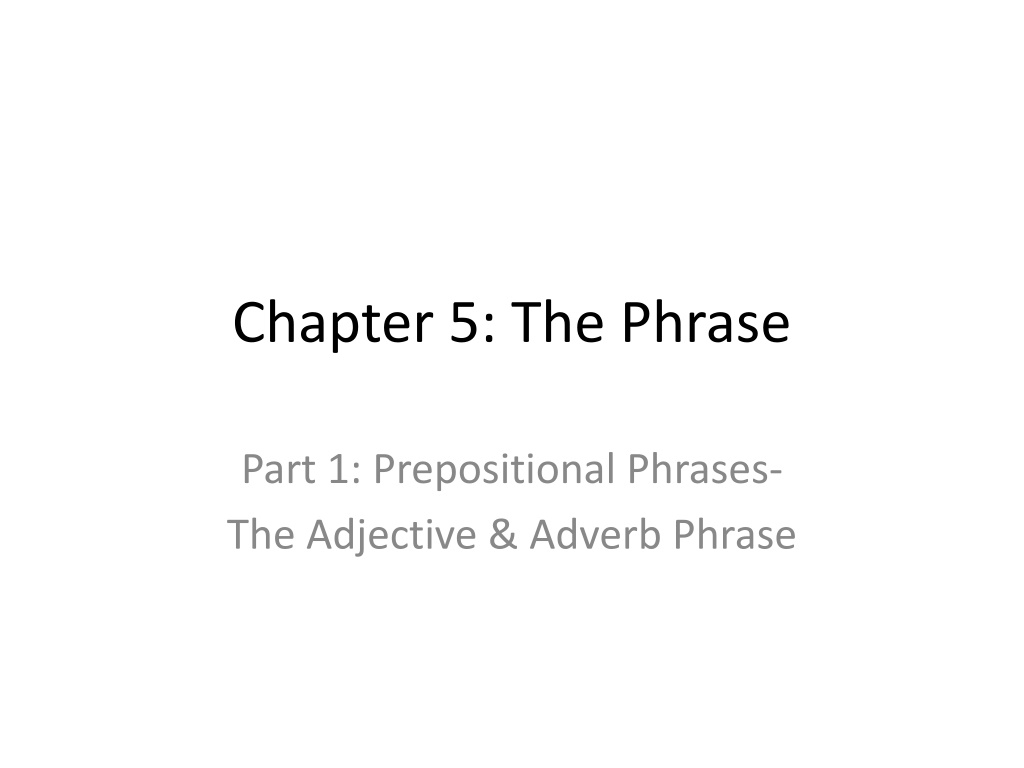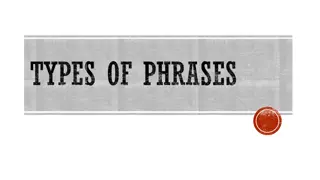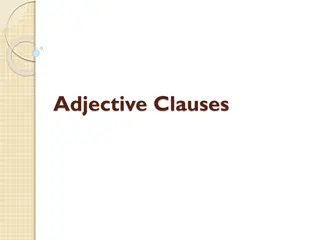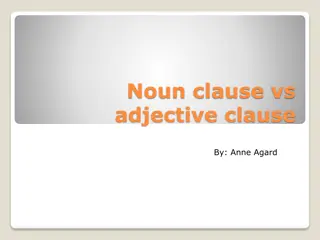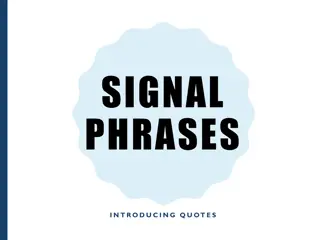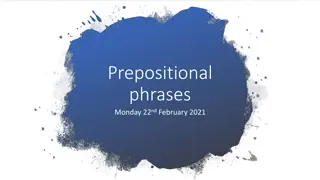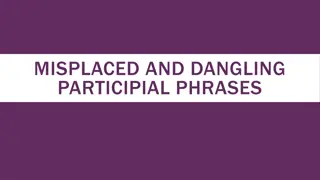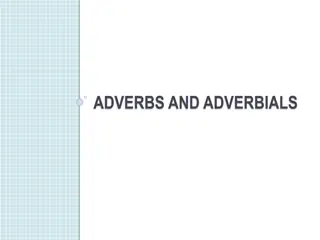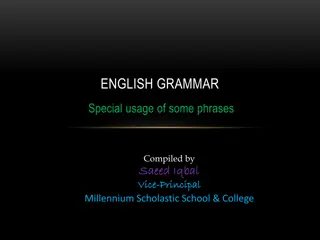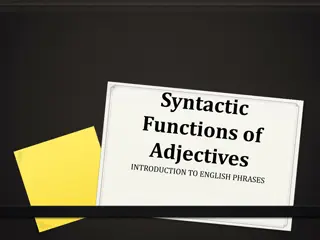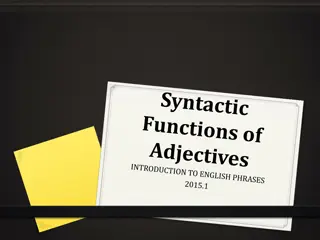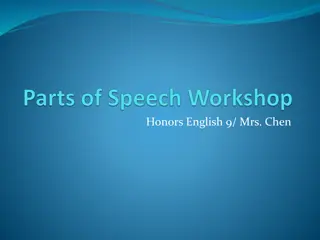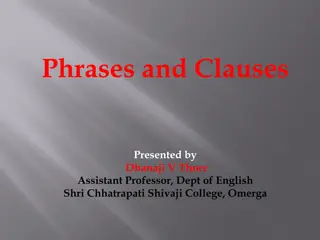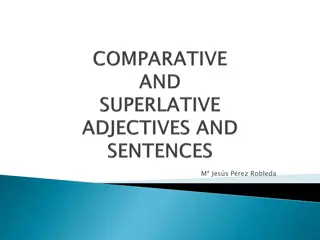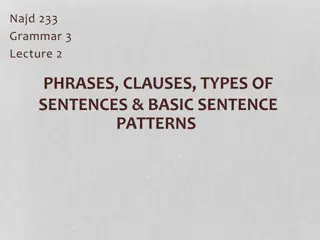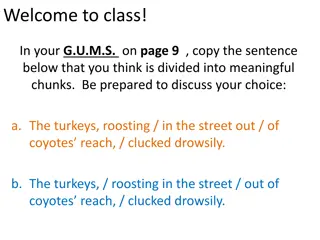Understanding Adjective Phrases in English Grammar
Learn about adjective phrases in English grammar through examples and explanations. Explore how these phrases describe nouns or pronouns, answer questions like "What kind?" or "How many?", and usually follow the words they describe. Enhance your understanding with practice exercises and tips for identifying and using adjective phrases effectively.
Download Presentation

Please find below an Image/Link to download the presentation.
The content on the website is provided AS IS for your information and personal use only. It may not be sold, licensed, or shared on other websites without obtaining consent from the author. Download presentation by click this link. If you encounter any issues during the download, it is possible that the publisher has removed the file from their server.
E N D
Presentation Transcript
Chapter 5: The Phrase Part 1: Prepositional Phrases- The Adjective & Adverb Phrase
What is a phrase? A group of words that is missing a verb, a subject, or both Examples: in the kitchen (no subject or verb) could have been hiding (no subject) to go with them (no subject)
PracticeAre these phrases or not when you know NP in the garden P (missing subject and verb) is sleeping P (missing subject) how she remembered NP smiling brightly P (missing subject) to the supermarket P (missing subject and verb)
Kinds of Phrases 1) Prepositional Phrase: Begins with a preposition (remember your song because now you really need it!!!) Ends with a noun or pronoun
Example Prepositional Phrases during the day Preposition: during Noun/pronoun: day with us Preposition: with Noun/pronoun: us
Kinds of Phrases contd 1A) The Adjective Phrase A prepositional phrase that describes a noun or pronoun So, it begins with a preposition and ends with a noun, but it goes back to or is giving extra information about a noun or pronoun Charles Dickens wrote many tales {about poverty}. about poverty = the adjective phrase (begins with about, ends with poverty) tales = the noun it is giving extra information about
Adjective Phrase contd Answers the questions: What kind? How many? Which one? How much? **TIP** Adjective phrases usually follow the word or words they describe
Adjective Phrase contd You try Easy-----The store with the neon sign is open. Harder----Here s a gift for you from Mr. B. Hardest-----A majority of the animals in the world sleep during the day.
Adjective Phrase Answers: Easy-----The store {with the neon sign} is open. with the neon sign = adjective phrase store = noun it is describing (answers: which one?) Harder----Here s a gift {for you} {from Mr. B}. for you = adjective phrase from Mr. B = adjective phrase gift = noun that BOTH phrases are describing (answers: which one?) Hardest-----A majority {of the animals} {in the world} sleep during the day. of the animals = adjective phrase majority = noun it is describing (answers: how many?) in the world = adjective phrase animals = noun it is describing (part of the 1stadjective phrase) (answers: what kind?)
Kinds of Phrases contd 1B) The Adverb Phrase A prepositional phrase that describes a verb, adjective, or adverb So, it begins with a preposition and ends with a noun, but it goes back to or is giving extra information about a verb, adjective, or adverb The Ford Motor Company was founded {by Henry Ford} {in 1903}. by Henry Ford = adverb phrase in 1903 = adverb phrase was founded = verb they are giving extra info about
Adverb Phrase contd Answers the questions: When? Where? How? Why? How often? How long? To what extent? **TIP** like adverbs, adverb phrases can move around in the sentence. Adjective phrases usually only follow the word or words they describe.
Adverb Phrase contd You try Easy----We got our new puppy at the animal shelter. Harder----She drove for hours through the storm. Hardest----The boat landed on the island near the coast.
Adverb Phrase Answers Easy----We got our new puppy {at the animal shelter}. at the animal shelter = adverb phrase got = verb it is describing (answers: where?) Harder----She drove {for hours} {through the storm}. for hours = adverb phrase through the storm = adverb phrase drove = verb that BOTH phrases are describing (answers: how long? and where?) Hardest----The boat landed {on the island} {near the coast}. on the island = adverb phrase landed = verb it is describing (answers: where?) near the coast = adjective phrase island = noun it is describing (part of the adverb phrase) (answers: which one?)
Chapter 5: The Phrase Part II: Verbal Phrases- The Participle & Infinitive Phrases
What is a Participle? A verb form that can be used as an adjective (describes a noun or pronoun) 1) Present Participle = ends in ing 2) Past Participle = ends in d or ed Some past participles are irregular and do not have this ending For example: frozen I went ice skating on the frozen pond. Frozen = past participle Pond = noun it is describing
Practice: pg 99-100 Find the participles and nouns/pronouns they describe: Annoyed, I went inside to watch TV. Annoyed = past participle I = pronoun it is describing I woke my sleeping father to ask about mosquitoes. Sleeping = present participle Father = noun it is describing Sucking blood for food, mosquitoes survive in many different cultures. Sucking = present participle Mosquitoes = noun it is describing Bites make the skin swell, and the swollen skin itches. Swollen = past participle Skin = noun it is describing
Participle Phrase Participle phrases are used as adjectives (describes a noun/pronoun) Begins with a participle and contains all describing words Examples: Stretching slowly Predicted by the meteorologist Reading the assignment
Participle Phrases Tips: Look for words that end in ing or are past tense Ask: Who or What is that word talking about? Check to make sure the who or what is a noun **Many times, these phrases have commas after them!
You Try Cheering for the team, we celebrated the victory. Cheering for the team (uses present participle) Shown here, his design for the newest fighter jet was the first one in history. Shown here (uses past participle) Have you ever heard of International Left- Hander s Day, celebrated on August 13? Celebrated on August 13 (uses past participle)
What is an infinitive? A verb form that can be used as a noun, adjective, or adverb. Most infinitives begin with the preposition to **They are ALWAYS followed by a VERB** Examples: To remain To meet To dream
You Try My first stop would be to visit the Statue of Liberty. To visit = infinitive France gave the statue to the U.S. in 1884. None It was a gift to express the friendship between the two nations. To express = infinitive
Infinitive Phrases An infinitive phrase begins with the infinitive (to + a verb) and contains all describing words & prepositional phrases Examples: To be a good gymnast To fly over both the North and South Poles To go to the gym now
You Try A bird sings to claim its territory. To claim its territory Human beings learned to build aircraft by carefully studying the way birds fly. To build aircraft To recognize the songs of different birds takes many hours of practice. To recognize the songs of different birds Birds use their feathers to push their bodies through the air. To push their bodies through the air
Part III: Phrases Appositive Phrases
What is an appositive? It is a noun or pronoun placed beside another noun or pronoun to describe or give more information about it. Most often, they are surrounded by commas. Example: My teacher, Mr. Craig, enjoys books by Jane Austen. Mr. Craig = appositive Teacher = noun it is describing
Appositive Phrase A phrase that is giving more information about a noun or pronoun. Examples: Frankie, a goodhearted and intelligent girl, is a pleasure to teach. Set off by commas & can be taken out Trevor s friend Mike sometimes gives Trevor poor advice. Not set off by commas because Trevor has more than one friend, so Mike s name is important in the sentence
You Try My sister Alyssa is a hard worker. Alyssa = appositive Sister = noun it is describing Chris, my next door neighbor, is a carpenter. My next door neighbor = appositive phrase Chris = noun it is describing Will your cousin Tiffany visit you this summer? Tiffany = appositive Cousin = noun it is describing Gino is playing with his favorite toy, the Thomas train set. The Thomas the train set = appositive phrase Toy = noun it is describing Jackson Square, a landmark in New Orleans, has a statue of Andrew Jackson on it. A landmark in New Orleans = appositive phrase Jackson Square = noun it is describing
